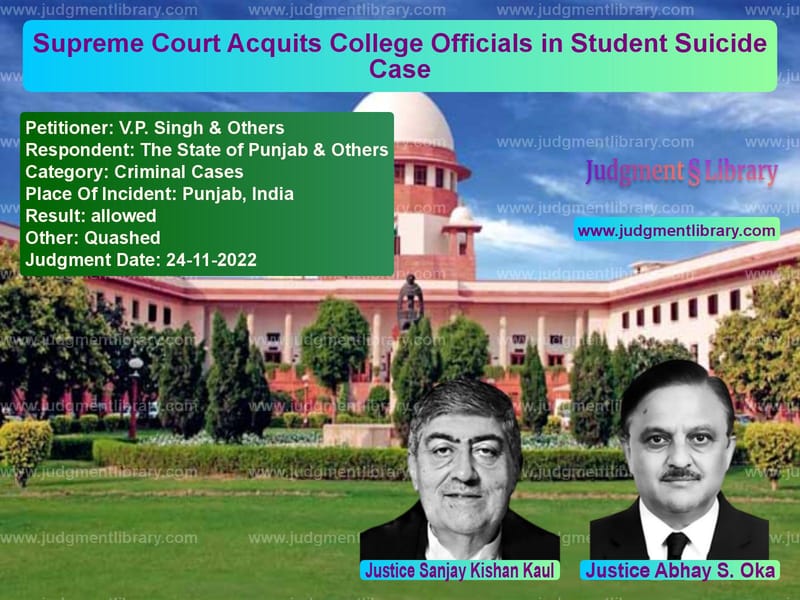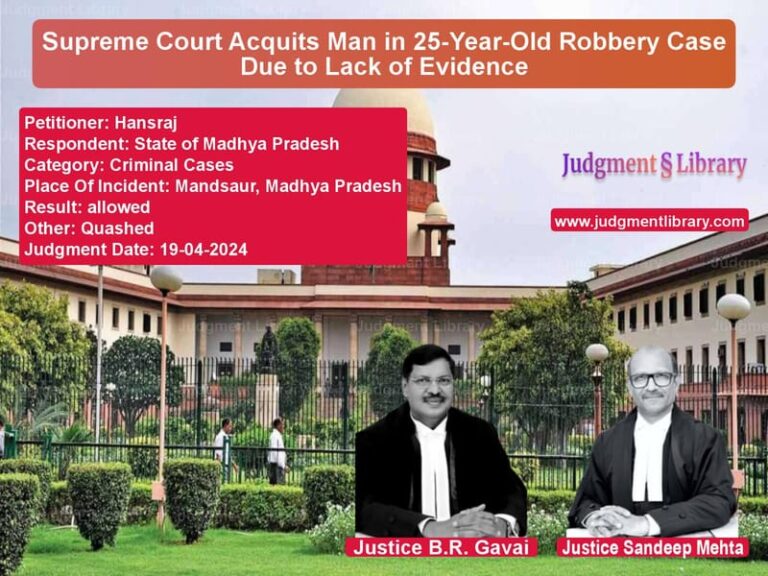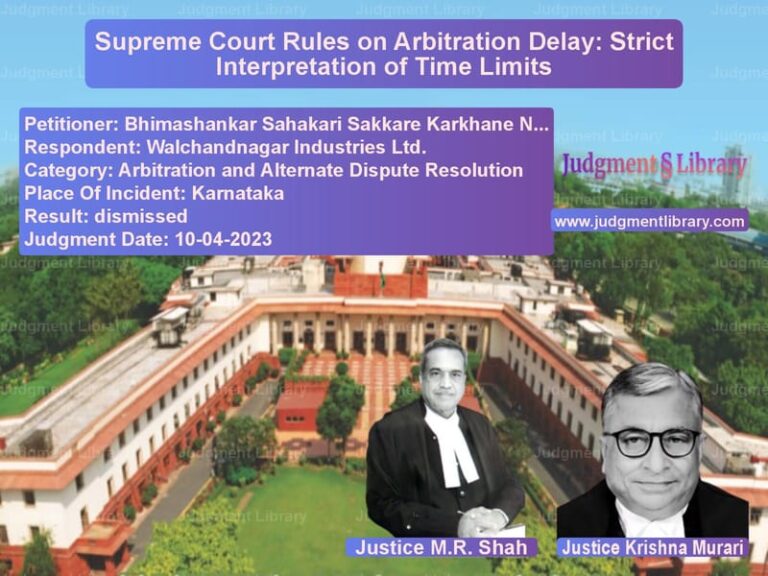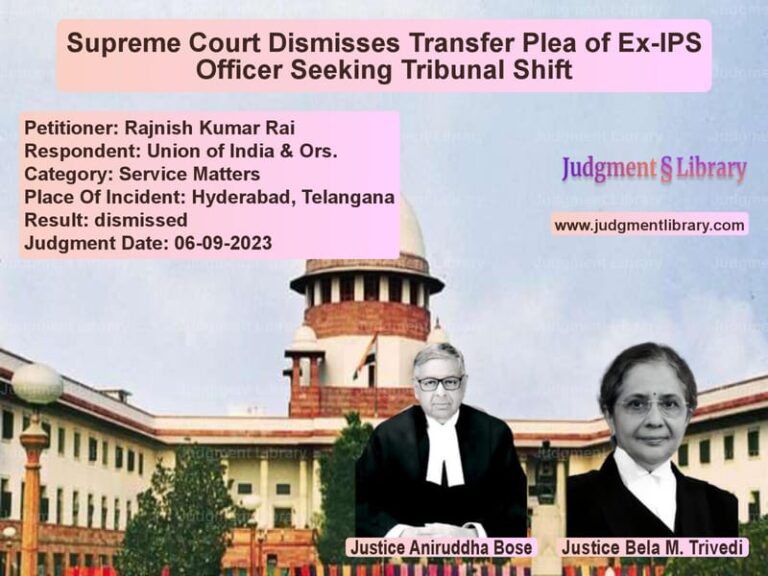Supreme Court Acquits College Officials in Student Suicide Case
The Supreme Court of India has delivered a significant ruling in the case of V.P. Singh & Others vs. The State of Punjab & Others. The case revolved around the tragic suicide of a college student, Mr. Gaurav Wahi, and the subsequent criminal charges of abetment of suicide against his teachers and college officials. The Supreme Court overturned the Punjab High Court’s decision and ruled in favor of the accused, setting an important precedent regarding the legal definition of abetment of suicide.
The judgment underscores that mere disciplinary actions taken by educational institutions cannot be construed as abetment of suicide under Section 306 of the Indian Penal Code (IPC), unless there is clear instigation or direct intent.
Background of the Case
The case began in April 2008, when the deceased, Mr. Gaurav Wahi, a student at a college in Punjab, was reprimanded by his professor, Mr. Nitin Shyam, for allegedly misbehaving in class under the influence of alcohol. Following the incident:
- The teacher reported the misbehavior to the Head of Department (HoD), Mr. Sarabjit Singh.
- The college administration suspended the student and asked him to call his parents.
- The student later wrote a letter of apology, denying intoxication but accepting the misconduct.
- The college principal, Mr. V.P. Singh, issued a notice requiring the student to deposit a security amount of Rs. 10,000 and mandated his parents’ presence before he could resume classes.
- Before complying, Mr. Wahi tragically died by suicide by jumping into a canal.
His father lodged an FIR accusing the teacher, HoD, and principal of abetment of suicide. The case went through multiple legal battles, including bail proceedings and charge-sheet submissions, leading to the framing of charges in April 2009. The accused challenged the High Court’s decision in the Supreme Court.
Arguments by the Parties
Appellants (Accused Teachers & College Officials)
- Argued that their actions were part of regular disciplinary measures to maintain order in an educational institution.
- Stated that there was no intention to instigate suicide and that they had merely followed college policies.
- Pointed out that there was no evidence of direct provocation or coercion to take such an extreme step.
- Cited legal precedents emphasizing that mere disciplinary action does not constitute abetment.
Respondents (State of Punjab & Student’s Family)
- Claimed that the suspension and demand for a security deposit caused undue mental distress to the deceased.
- Highlighted that the student had sent an SMS to his brother before the suicide, indicating emotional turmoil.
- Argued that the accused ought to have foreseen the impact of their actions and thus bore responsibility.
Observations by the Supreme Court
The Supreme Court examined the case through the lens of Section 306 IPC (Abetment of Suicide) and relevant legal precedents. Key observations included:
- Absence of Mens Rea: The Court found no evidence of intent or encouragement from the accused to push the deceased towards suicide.
- Disciplinary Actions Cannot Be Criminalized: Legitimate actions taken by educational institutions to enforce discipline do not amount to abetment of suicide.
- Suicide Note & Evidence Did Not Implicate the Accused: There was no mention of harassment or coercion by the accused in the student’s last communication.
The Court quoted:
“Abetment involves a mental process of instigating a person or intentionally aiding a person in doing an act. Without a positive act to instigate or aid suicide, conviction cannot be sustained.”
Final Verdict
The Supreme Court allowed the appeal and ruled as follows:
- The High Court’s decision was quashed.
- The accused were discharged from all charges.
- The Court clarified that disciplinary actions should not be misconstrued as criminal offenses unless accompanied by clear intent to provoke self-harm.
Impact of the Ruling
This ruling has broad implications for educators and administrators across India. Key takeaways include:
- Protection for Teachers & Administrators: Schools and colleges can take disciplinary action without fear of criminal liability for unforeseen consequences.
- Strict Interpretation of Abetment: The decision reinforces that only direct and clear instigation can be prosecuted under Section 306 IPC.
- Prevention of Misuse of Criminal Law: The ruling prevents the misuse of criminal law in emotionally charged cases where no legal culpability exists.
Conclusion
The Supreme Court’s judgment in this case clarifies the legal interpretation of abetment of suicide, ensuring that educational institutions can maintain discipline without facing undue criminal prosecution. While student well-being remains a priority, this ruling upholds the necessity of maintaining order in academic environments without legal overreach.
Read also: https://judgmentlibrary.com/supreme-court-acquits-protestors-in-kerala-public-property-damage-case/
This decision will likely influence future cases involving similar accusations, reinforcing the need for clear intent in abetment-related prosecutions.
Petitioner Name: V.P. Singh & Others.Respondent Name: The State of Punjab & Others.Judgment By: Justice Sanjay Kishan Kaul, Justice Abhay S. Oka.Place Of Incident: Punjab, India.Judgment Date: 24-11-2022.
Don’t miss out on the full details! Download the complete judgment in PDF format below and gain valuable insights instantly!
Download Judgment: v.p.-singh-&-others-vs-the-state-of-punjab-supreme-court-of-india-judgment-dated-24-11-2022.pdf
Directly Download Judgment: Directly download this Judgment
See all petitions in Suicide Cases
See all petitions in Legal Malpractice
See all petitions in Contempt Of Court cases
See all petitions in Judgment by Sanjay Kishan Kaul
See all petitions in Judgment by Abhay S. Oka
See all petitions in allowed
See all petitions in Quashed
See all petitions in supreme court of India judgments November 2022
See all petitions in 2022 judgments
See all posts in Criminal Cases Category
See all allowed petitions in Criminal Cases Category
See all Dismissed petitions in Criminal Cases Category
See all partially allowed petitions in Criminal Cases Category







